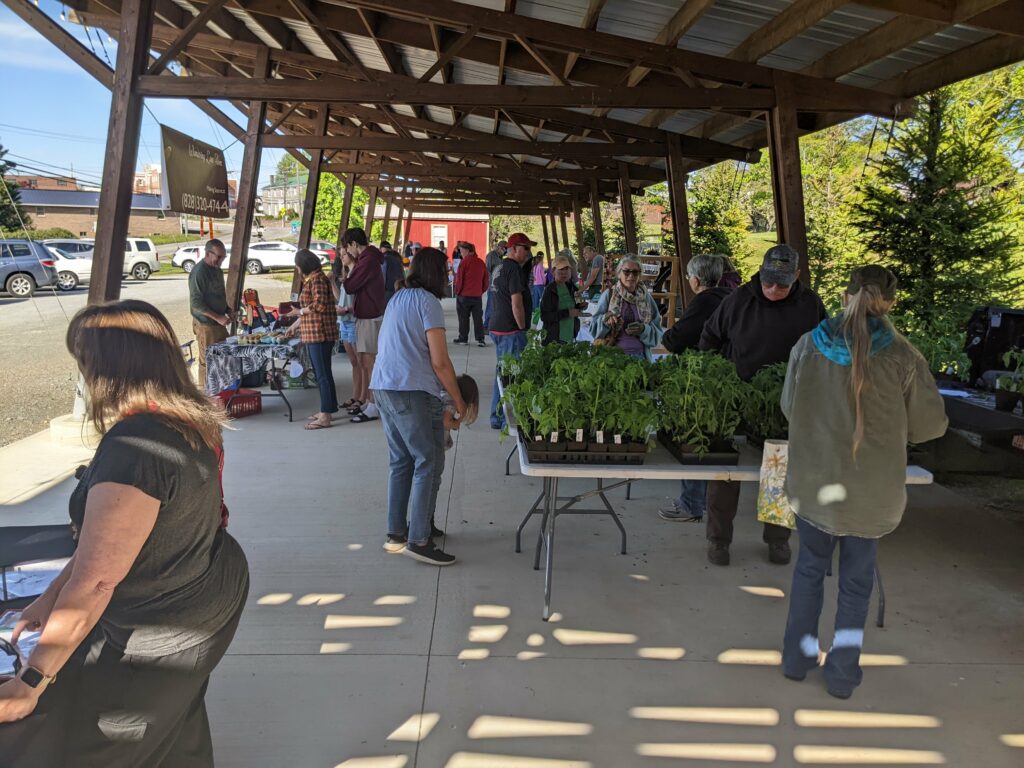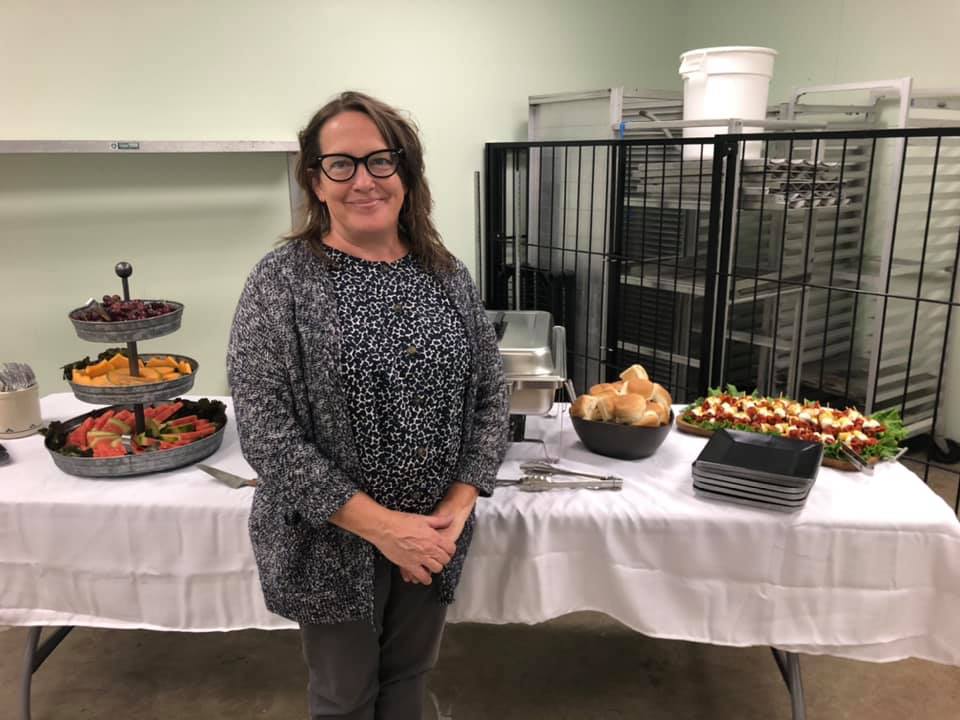Managing a Farmers Market and Shared-Use Kitchen: A Conversation With Jill Cockerham
go.ncsu.edu/readext?943776
en Español / em Português
El inglés es el idioma de control de esta página. En la medida en que haya algún conflicto entre la traducción al inglés y la traducción, el inglés prevalece.
Al hacer clic en el enlace de traducción se activa un servicio de traducción gratuito para convertir la página al español. Al igual que con cualquier traducción por Internet, la conversión no es sensible al contexto y puede que no traduzca el texto en su significado original. NC State Extension no garantiza la exactitud del texto traducido. Por favor, tenga en cuenta que algunas aplicaciones y/o servicios pueden no funcionar como se espera cuando se traducen.
Português
Inglês é o idioma de controle desta página. Na medida que haja algum conflito entre o texto original em Inglês e a tradução, o Inglês prevalece.
Ao clicar no link de tradução, um serviço gratuito de tradução será ativado para converter a página para o Português. Como em qualquer tradução pela internet, a conversão não é sensivel ao contexto e pode não ocorrer a tradução para o significado orginal. O serviço de Extensão da Carolina do Norte (NC State Extension) não garante a exatidão do texto traduzido. Por favor, observe que algumas funções ou serviços podem não funcionar como esperado após a tradução.
English
English is the controlling language of this page. To the extent there is any conflict between the English text and the translation, English controls.
Clicking on the translation link activates a free translation service to convert the page to Spanish. As with any Internet translation, the conversion is not context-sensitive and may not translate the text to its original meaning. NC State Extension does not guarantee the accuracy of the translated text. Please note that some applications and/or services may not function as expected when translated.
Collapse ▲ Jill Cockerham serves as the Local Foods Coordinator for Ashe and Alleghany County Extension Centers in the North Central District where her primary responsibilities include managing the Alleghany Farmers Market and the High Country Commercial Kitchen. Alleghany Farmers Market is a producer-only market located at Crouse Park in downtown Sparta, and the High Country Commercial Kitchen is a shared-use, incubator kitchen available for caterers, food trucks, NCDA-inspected food entrepreneurs, and farmers and producers located in Jefferson, NC. “Working closely with NCDA and the health department, I have gained a more in-depth understanding of the oftentimes complex and nuanced regulatory requirements that food businesses must navigate in order to legally operate.” Jill also assists farmers and value-added producers in finding grant funding opportunities, developing and expanding product lines, and establishing new market opportunities.
Jill Cockerham serves as the Local Foods Coordinator for Ashe and Alleghany County Extension Centers in the North Central District where her primary responsibilities include managing the Alleghany Farmers Market and the High Country Commercial Kitchen. Alleghany Farmers Market is a producer-only market located at Crouse Park in downtown Sparta, and the High Country Commercial Kitchen is a shared-use, incubator kitchen available for caterers, food trucks, NCDA-inspected food entrepreneurs, and farmers and producers located in Jefferson, NC. “Working closely with NCDA and the health department, I have gained a more in-depth understanding of the oftentimes complex and nuanced regulatory requirements that food businesses must navigate in order to legally operate.” Jill also assists farmers and value-added producers in finding grant funding opportunities, developing and expanding product lines, and establishing new market opportunities.
Not many people can say they love working on Saturdays but Jill shared that her favorite part of her role is farmers market Saturdays! “The Alleghany Farmers Market is a great place for community members to gather, hang out, and meet face-to-face with local growers, producers & craftspeople. It’s also an easy, cost-effective way to launch a new food business or find willing customers for your garden excess of zucchini! Farmers markets foster the human connection in the grower-consumer relationship that is mostly invisible on a commercial scale” she said.
Jill’s Local Food Landscape
Alleghany and Ashe County are located in the northwestern corner of North Carolina, bordered by Tenneessee and Virginia. Alleghany is the fifth-smallest county in land area (233 square miles) and the sixth-smallest in population with approximately 11,000 residents (NCpedia). Jill shared there is just one grocery store in the county. Christmas tree farms are a huge part of the agriculture production in both counties, with corn, tobacco, cattle, and poultry falling closely behind (NCpedia). Ashe County is also known for its cheese production. Jill shared that because of the significant difference in regulatory requirements in Virginia and Tennessee compared to North Carolina, it can be challenging to attract value-added producers to markets in her counties because the other states have more relaxed cottage kitchen laws governing food production and sales.
Jill’s Primary Projects & Programs
Jill is currently working to accept EBT/SNAP benefits at the Alleghany Farmers Market. She also serves on the Food Access Working Group as part of the Wellness Coalition (in Alleghany County) where other community stakeholders are assisting with funding market projects and infrastructure upgrades. For her kitchen manager role, Jill is part of the North Carolina Network of Incubator Kitchens (NC-NIK), a statewide collaborative of food-based business incubators across the state. Through NC-NIK, she formed a partnership with WE Power Food in Hillsborough, NC and helped host a WE Power Food Empowerment Expo event in September 2022 in Boone. “WE Power Food is designed for women, led by women, to empower and support women food producers through strong networks and the sharing of resources,” (WE Power Food). Coming up in July 2023, High Country Community Kitchen will provide space for a 12-week Culinary Training Program featuring local chefs and instructors in conjunction with Wilkes Community College and Lost Province Cultural Arts Center.
For her kitchen manager role, Jill is part of the North Carolina Network of Incubator Kitchens (NC-NIK), a statewide collaborative of food-based business incubators across the state. Through NC-NIK, she formed a partnership with WE Power Food in Hillsborough, NC and helped host a WE Power Food Empowerment Expo event in September 2022 in Boone. “WE Power Food is designed for women, led by women, to empower and support women food producers through strong networks and the sharing of resources,” (WE Power Food). Coming up in July 2023, High Country Community Kitchen will provide space for a 12-week Culinary Training Program featuring local chefs and instructors in conjunction with Wilkes Community College and Lost Province Cultural Arts Center. Other things Jill hopes to offer in the near future include workshops on starting a food business, small-scale grower events, and permaculture/horticulture workshops. She also hopes to create a food business resource guide. Jill shared that “since I’m the only (to my knowledge) Extension Local Foods Agent who actively manages both a farmers market and shared-used kitchen, it gives me a unique perspective on local food trends, community needs and small food businesses.”
Other things Jill hopes to offer in the near future include workshops on starting a food business, small-scale grower events, and permaculture/horticulture workshops. She also hopes to create a food business resource guide. Jill shared that “since I’m the only (to my knowledge) Extension Local Foods Agent who actively manages both a farmers market and shared-used kitchen, it gives me a unique perspective on local food trends, community needs and small food businesses.”
Jill’s Final Thoughts
Jill credits a lot of the current local food scene markets and promotion in NC to organizations like ASAP, CFSA, Organic Growers School, and of course N.C. Cooperative Extension. She thinks that local agriculture and food businesses will continue to grow and put NC as a leader in local food promotion and production.
Jill’s Favorite Place to Buy Local and Favorite Recipes Using Local Food
“I’d like to think I’m one of the best customers at the market I manage!” Jill shared that through shopping at the market each week for produce and meat she only has to supplement a few things from the grocery store. She also finds that the market is a great place to shop for local gifts like cutting boards, body care products, and lots of other handmade goods. “My favorite recent market finds have been garlic scapes (for garlic scape pesto) and a new kitchen user’s homegrown blueberry-raspberry jam!”


